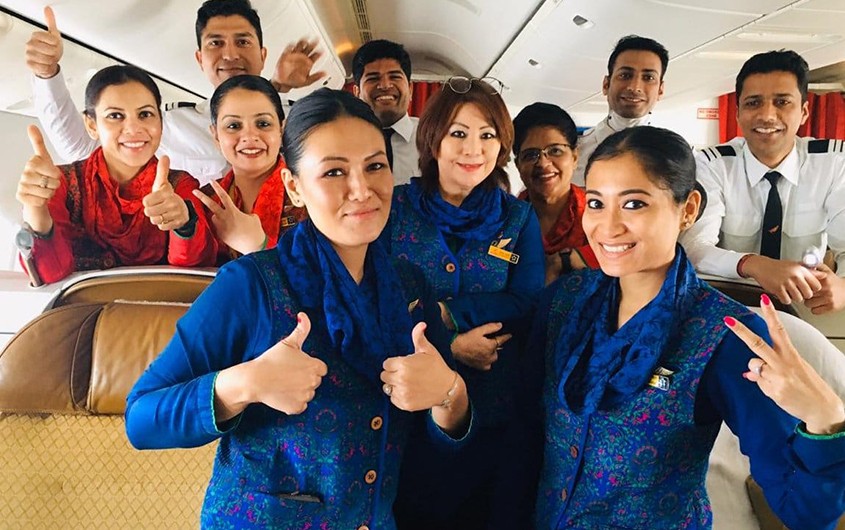
Cabin Crew is very essential to the aviation industry's dynamic operations and provides outstanding customer service. The need for qualified workers in this industry is always increasing, therefore enrolling in an aviation course designed specifically for air hostesses can lead to new employment options. This article delves into the specifics of aviation programs that are geared toward passenger support positions and how they might assist people in starting a fulfilling career in the aviation sector.
A Distance Cabin Crew Course in Aviation is designed to provide aspiring cabin crew members with the knowledge, skills, and training necessary to embark on a successful career in the aviation industry. Here's an outline of what such a course might entail.
The role of cabin crew, often referred to as flight attendants or air hostesses, is integral to ensuring the safety, comfort, and well-being of passengers during air travel. Here's a comprehensive overview of their responsibilities and duties:
1. Safety and Emergency Procedures:
Cabin crew members are primarily responsible for the safety of passengers and crew onboard the aircraft.
Conduct pre-flight safety demonstrations and provide instructions on emergency procedures, including the use of safety equipment and evacuation protocols.
Remain vigilant throughout the flight to identify and respond promptly to any safety concerns or emergencies, such as turbulence, medical incidents, or security threats.
2. Cabin Cleanliness and Presentation:
Ensure the cleanliness and hygiene of the aircraft cabin throughout the flight, including restocking supplies, tidying up seating areas, and maintaining lavatories.
Present a professional appearance and adhere to grooming standards set by the airline, including wearing the designated uniform and name tag.
3. Security and Compliance:
Enforce security measures and regulations to safeguard passengers, crew, and aircraft against potential threats or hazards.
Assist with passenger screening procedures, baggage checks, and adherence to security protocols before and during the flight.
Remain vigilant for any suspicious behavior or unauthorized activities onboard and report them to the flight deck crew or relevant authorities as necessary.
4. Teamwork and Collaboration:
Work closely with fellow cabin crew members to ensure efficient and effective service delivery.
Support colleagues during busy periods, emergencies, or irregular operations, and foster a positive team spirit in the cabin crew environment.
Communicate and coordinate with the flight deck crew to address any operational or safety-related concerns and ensure a cohesive approach to cabin operations.
5. Crisis Management and Problem-Solving:
Remain calm and composed in high-pressure situations, such as medical emergencies, disruptive passengers, or equipment malfunctions.
Follow established procedures and protocols to manage crises effectively, prioritize passenger safety, and mitigate risks to the aircraft and its occupants.
Exercise sound judgment and decision-making skills to resolve conflicts, address passenger concerns, and maintain order and control onboard.
Aviation courses tailored for cabin crew members provide comprehensive training and education to equip individuals with the skills and knowledge necessary to excel in their roles. Here's an overview of some common aviation courses specifically designed for cabin crew.
Airport Operations:- Understanding airport infrastructure, procedures, and regulations.
Customer Service Excellence:- Developing effective communication, problem-solving, and interpersonal skills.
Baggage Handling and Security Protocols:- Learning proper baggage handling techniques and security procedures to ensure passenger safety.
Passenger Handling and Conflict Resolution:- Managing passenger interactions professionally and resolving conflicts with diplomacy and tact.
Emergency Preparedness:- Training in emergency response procedures, including evacuation drills and first aid training.
1. Exciting Career Opportunities:- Completing a cabin crew course opens doors to a dynamic and rewarding career in the aviation industry. Flight attendants have the opportunity to travel to various destinations, meet new people, and experience different cultures while working onboard flights.
2. Diverse Work Environment:- Working as a flight attendant offers a diverse and dynamic work environment, with opportunities to work on different types of aircraft, with diverse crew members, and serve passengers from various backgrounds and cultures.
3. Flexibility and Work-Life Balance:- Cabin crew members often enjoy flexible work schedules and the opportunity to bid for preferred routes or layover destinations. This flexibility allows them to balance their work commitments with personal and family responsibilities.
4. Global Exposure and Networking:- Flight attendants interact with passengers from around the world, allowing them to build a global network of contacts. They gain exposure to different cultures, languages, and lifestyles, which broadens their perspective and enriches their life experiences.
5. Training and Development Opportunities:- Airlines invest in the training and development of their cabin crew members to ensure they are well-prepared to handle various situations onboard flights. Completing a cabin crew course provides comprehensive training in safety procedures, customer service, emergency protocols, and aviation regulations, giving individuals a competitive edge in the job market.
6. Job Satisfaction:- For many, working as a flight attendant is more than just a job – it's a lifestyle and a passion. The opportunity to travel, meet new people, and make a positive impact on passengers' travel experiences can be immensely fulfilling and rewarding.
Pursuing a cabin crew course in the aviation industry offers numerous benefits, including exciting career opportunities, job security, competitive salary and benefits, personal and professional growth, global exposure, and job satisfaction. It's a rewarding career choice for individuals who are passionate about travel, customer service, and making a difference in the lives of others.